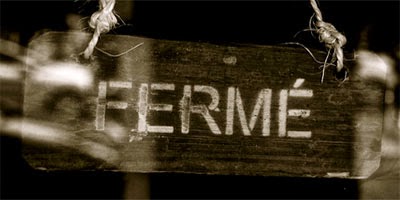
I had occasion, the other day, to visit for the first time the small village in northern France that was supposedly the home of my long-distant paternal ancestors.
It was pouring with rain. I had intended to mark my “return” with a coffee in a local café, but there only seemed to be one such venue and it was shut. Very shut.
The boulangerie was also closed, as was the pizzeria-crêperie. The only shop that appeared to be open was the boucherie, which is of limited appeal to a vegetarian. The butcher suspiciously glared out at me as I peered inside.
And that was that. No sudden thrill of centuries-old recognition, no instant bonding with the geographically-preserved spirit of my forefathers.
Of course. Did I really expect there to be? Didn’t I already know that the power of place to which we can often connect has nothing to do with our individuality or our genetic inheritance?
When I look back at the places that have made a real impression on me – that have reached out and seized me on the inside – I can see no personal, familial or tribal connection at all.
In all of them I felt a kind of forcefield, an energised memory still radiating patterns from what we call the past, making a mockery of our obsession with time by cutting straight through the centuries and plugging us directly into what is merely another aspect, not always accessible, of the same reality.
And this connection is available for all of us to experience.
A great tragedy of certain strands of the völkisch movement at the end of the 19th century, whether in pan-Germanic, pan-Slavic or Zionist form, was the espousal of specific sources of collective inspiration, related to the heredity of those concerned.
This kind of thinking is not a connection, but a cutting-off. Every German who revelled in the heritage of the “Indo-Aryan” peoples was spurning the opportunity to draw deeper from the well of human experience, denying him or herself any soul-connection with the peoples behind the wisdom of Taoism, native American spirituality, Sufism or the Kabbalah.
Why do this? Defining oneself in terms of one particular “race” or “nation” (in spite of the patent absurdity of these rigid classifications) is an extension of egotism.
It is a means of establishing one’s own identity by contrast with an “other”, which one is not. The corollary of a sense of pride in this identity is, of course, a projection of all the bad qualities one does not like about oneself on to those who do not share this specific identity.
European colonialists elevated their own sense of self-worth by abasing, in their minds, the value of indigenous peoples and their cultures. Nazis did the same to Jews and right-wing Zionists do the same today to Palestinians. And so on.
I would conclude by saying that the only connection worth having is to the whole of humankind, but this does not go far enough. A love of humanity that is matched by a callous indifference to the sentient creatures with whom we share this planet is a blinkered and lop-sided affair.
If you believe, as I do, that the whole of Earth, indeed the universe, is sentient on a macrocosmic level, then the picture becomes clearer.
It is the Whole to which we must connect, and we should not limit ourselves to narrow concepts of how and where we might find that connection, which may lie hidden in the shadows of a mountain forest or glitter in the eyes of a passing stranger in a city street.
If we are to find those points, those moments, then we need to keep our minds and hearts constantly open and ready to embrace them.
One thing for sure, as I found out, is that they won’t be neatly marked out for us on a Michelin map or solemnly inscribed in your family tree.
* I am back from France in time to give my talk at the Anarchist Bookfair in London on Saturday October 19 at 5pm. See you there!
Leave a Reply